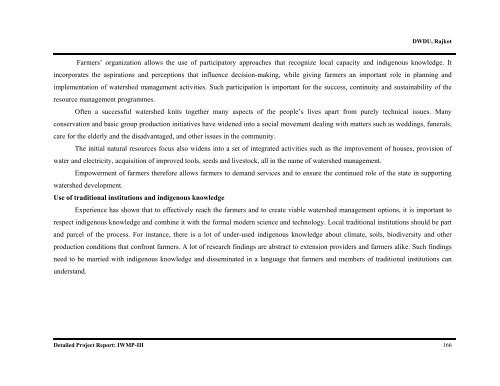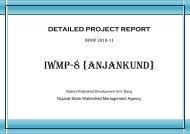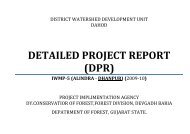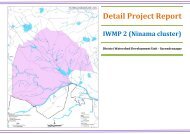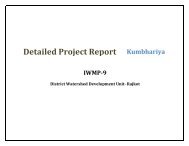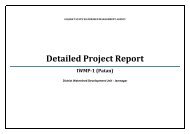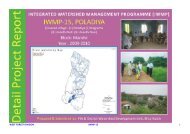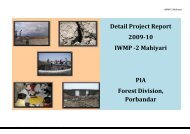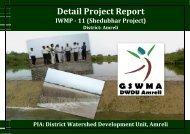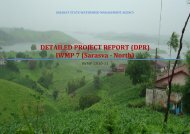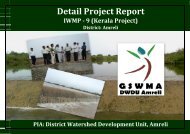IWMP-3 - Commissionerate of Rural Development Gujarat State ...
IWMP-3 - Commissionerate of Rural Development Gujarat State ...
IWMP-3 - Commissionerate of Rural Development Gujarat State ...
You also want an ePaper? Increase the reach of your titles
YUMPU automatically turns print PDFs into web optimized ePapers that Google loves.
DWDU, Rajkot<br />
Farmers’ organization allows the use <strong>of</strong> participatory approaches that recognize local capacity and indigenous knowledge. It<br />
incorporates the aspirations and perceptions that influence decision-making, while giving farmers an important role in planning and<br />
implementation <strong>of</strong> watershed management activities. Such participation is important for the success, continuity and sustainability <strong>of</strong> the<br />
resource management programmes.<br />
Often a successful watershed knits together many aspects <strong>of</strong> the people’s lives apart from purely technical issues. Many<br />
conservation and basic group production initiatives have widened into a social movement dealing with matters such as weddings, funerals,<br />
care for the elderly and the disadvantaged, and other issues in the community.<br />
The initial natural resources focus also widens into a set <strong>of</strong> integrated activities such as the improvement <strong>of</strong> houses, provision <strong>of</strong><br />
water and electricity, acquisition <strong>of</strong> improved tools, seeds and livestock, all in the name <strong>of</strong> watershed management.<br />
Empowerment <strong>of</strong> farmers therefore allows farmers to demand services and to ensure the continued role <strong>of</strong> the state in supporting<br />
watershed development.<br />
Use <strong>of</strong> traditional institutions and indigenous knowledge<br />
Experience has shown that to effectively reach the farmers and to create viable watershed management options, it is important to<br />
respect indigenous knowledge and combine it with the formal modern science and technology. Local traditional institutions should be part<br />
and parcel <strong>of</strong> the process. For instance, there is a lot <strong>of</strong> under-used indigenous knowledge about climate, soils, biodiversity and other<br />
production conditions that confront farmers. A lot <strong>of</strong> research findings are abstract to extension providers and farmers alike. Such findings<br />
need to be married with indigenous knowledge and disseminated in a language that farmers and members <strong>of</strong> traditional institutions can<br />
understand.<br />
Detailed Project Report: <strong>IWMP</strong>-III 166


